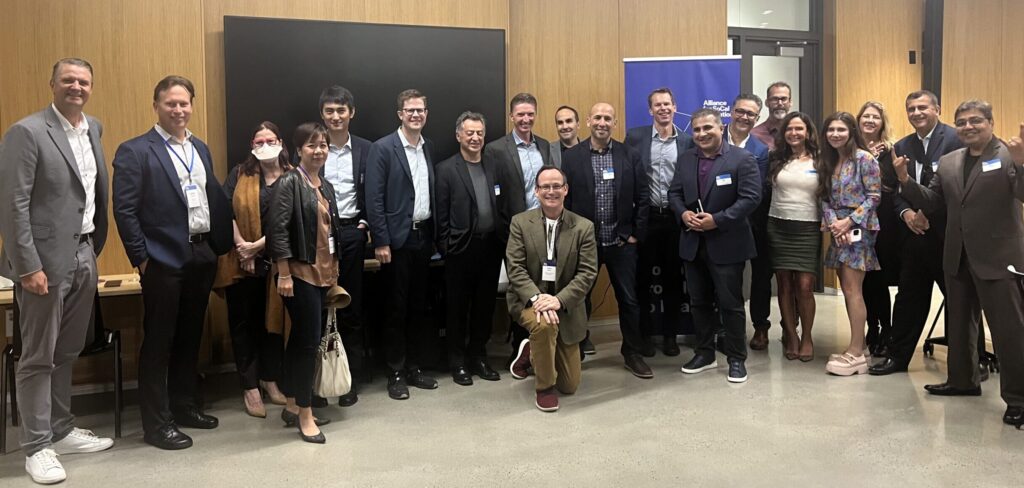Unleashing the Power of AI in Life Sciences: A Discussion With Industry Leaders

In the heart of Southern California’s innovation hub, the Alliance for SoCal Innovation recently brought together some of the brightest minds in the fields of healthcare, data, and artificial intelligence. Collaborating with Foresite Capital, this remarkable event took place at UCSD’s cutting-edge Design & Innovation building. The discussion centered around the transformative potential of AI in life sciences. With introductory remarks from Microsoft’s Austin Walsh, the Managing Director of US Healthcare, Data, and AI, the event featured a dynamic panel discussion with Eran Halperin, a Professor in the Department of Computational Medicine at UCLA, and Trey Ideker, the Co-Director of the Bioinformatics and Systems Biology PhD Program at UCSD, all skillfully moderated by Vik Bajaj, Managing Director at Foresite Capital.
In the quest to revolutionize life sciences through artificial intelligence, several key issues emerged during this engaging conversation. These issues spanned the normalization and collection of data, the establishment of trust with consumers, and identifying the most suitable early use cases. Additionally, the discussion explored the potential business models that could address lower-risk use cases, such as workflow optimization and transcription services, in order to generate the savings and investments required to develop data for higher-value applications.
Data Normalization and Collection: The Foundation of AI in Life Sciences
One of the central challenges discussed was the normalization and collection of data. AI’s effectiveness in life sciences hinges on the quality and quantity of data available for analysis. The group emphasized the need for standardization in data formats, as different healthcare systems often employ disparate methods of recording information. The lack of data uniformity poses a significant obstacle in harnessing the full potential of AI.
The development of more sophisticated AI algorithms could help bridge these data disparities, potentially making sense of data even when it’s not perfectly normalized. The combination of standardization efforts and AI advancements promises to unlock the treasure trove of healthcare data and deliver profound insights for personalized medicine and accelerated drug discovery.
Building Trust in AI Solutions for Life Sciences
Creating trust among customers and end-users emerged as another critical issue. The panelists and the group at large emphasized the importance of establishing confidence in AI-driven healthcare solutions, especially given the sensitivity and high stakes involved in the field. Patients, doctors, and healthcare providers need to have faith in the technology, and this trust is built through transparency, accountability, and responsible use of AI.
There was a general consensus that regulatory bodies need to keep up with AI innovations, ensuring that policies are in place to safeguard patient data and uphold ethical standards – however, there were different opinions to the extent. The group agreed it would best serve the industry to “get ahead of the policy-makers” to craft appropriate frameworks given the general skepticism that they would have the expertise to find the sweet spot. As AI becomes more integrated into healthcare, stakeholders must actively collaborate to set appropriate guidelines in order to develop and maintain trust within the industry.
Early Use Cases: A Stepping Stone to AI in Life Sciences
The discussion also revolved around finding appropriate early use cases for AI in life sciences. The panelists agreed that starting with lower-risk applications, like workflow optimization and transcription services, could help build trust while providing the cost savings to make the investments required to fund more ambitious AI projects including the collection and normalization of critical datasets.
These low-hanging fruits allow organizations to demonstrate the value of AI in tangible ways, which can, in turn, help gain buy-in from patients, government agencies, policy-maker, payors, and other key stakeholders. As businesses streamline their operations with AI-driven improvements, the data collected becomes a valuable resource for further innovation.
As the discussion concluded, it was clear that the fusion of AI and life sciences is a formidable force, poised to revolutionize patient care, drug discovery, and healthcare operations. Data normalization, trust-building, and selecting the right starting points were all recognized as key pillars to unlock the full potential of AI in the life sciences sector.
This leadership discussion served as a testament to the commitment of the Alliance for SoCal Innovation, Foresite Capital, Microsoft and their diverse partners in fostering innovation and collaboration within the frontiers of life sciences. The AI-driven healthcare innovation journey is certain to be challenging, but the potential for saving lives, reducing costs, and improving patient outcomes is by all measures extraordinary. As AI continues to evolve and shape the future of healthcare, these discussions serve as crucial stepping stones towards realizing this vision.